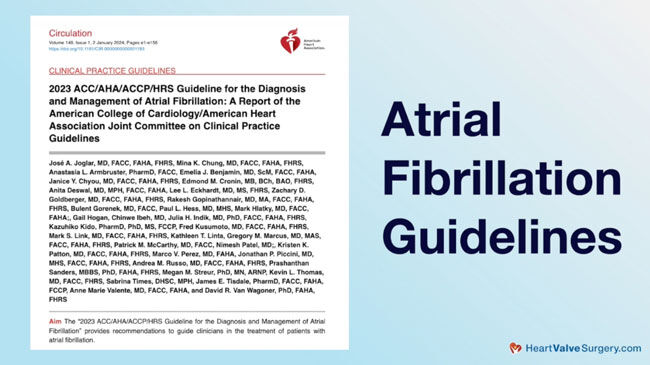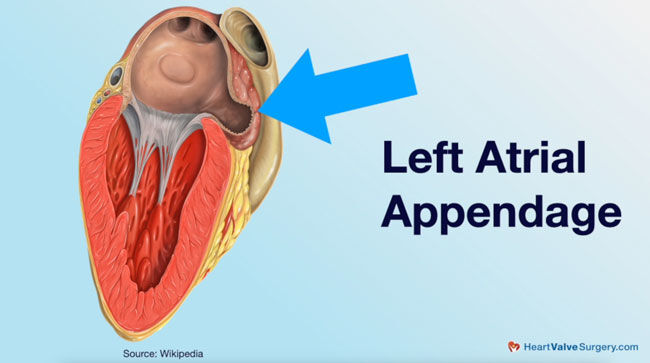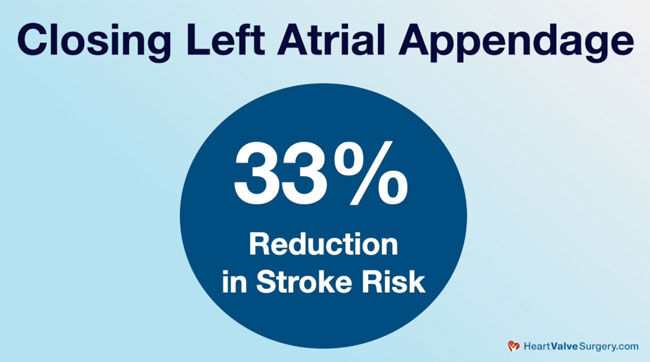Patient Alert: New Atrial Fibrillation Guidelines to Prevent Stroke for Heart Valve Patients
Written By: Allison DeMajistre, BSN, RN, CCRN
Medical Expert: Dr. Patrick McCarthy, Executive Director of the Bluhm Cardiovascular Institute at Northwestern Medicine
Reviewed By: Adam Pick, Patient Advocate
Published: March 14, 2024
Atrial fibrillation is the most common sustained heart arrhythmia in the United States and across the globe. Approximately 35% of patients with heart valve disease will also experience atrial fibrillation which significantly increases their risk of having a stroke. Given the serious and life-threatening nature of AFib, stroke and heart valve disease, the American Heart Association recently published new guidelines for treating atrial fibrillation during open-heart surgery.
I was recently in San Antonio at the 60th Annual Meeting of the Society of Thoracic Surgeons where I met with Dr. Patrick McCarthy, the Executive Director of the Bluhm Cardiovascular Institute at Northwestern Medicine in Chicago, Illinois, to find out more about the new atrial fibrillation guidelines and what they mean for heart valve surgery patients. As you may know, Dr. McCarthy is a heart valve expert that specializes in atrial fibrillation. During his career, Dr. McCarthy has performed over 5,000 heart valve procedures.
Key Learnings About New Atrial Fibrillation Guidelines
Dr. McCarthy gave a presentation about the new guidelines at the Society of Thoracic Surgeons annual meeting. Here are the highlights of that presentation that Dr. McCarthy wanted to share with the patients in our community.
 Dr. Patrick McCarthy
Dr. Patrick McCarthy
- The American Heart Association (AHA) guidelines were last updated seven years ago in 2017, and since then, there have been several new developments that are important for patients to know. Dr. McCarthy said, “One of the most critical developments is that if you have atrial fibrillation, you should ask your surgeon if they plan on closing the left atrial appendage during the operation.” The left atrial appendage is a small outpouching at the top of the heart’s atrium where blood clots form and often cause strokes.

- “We timed the removal I did during a valve surgery on Tuesday, and it took 86 seconds to close the appendage,” he told us. The data for successfully removing the left atrial appendage during surgery is overwhelming, and, according to Dr. McCarthy, they now know that the appendage removal will lead to a one-third reduction in the risk of stroke. “That’s about as good as it gets for something that has almost zero risk, is quick, and has such an impact on the long-term progress of patients,” he said. “It’s such an important breakthrough.”

- I asked Dr. McCarthy if patients who have had either consistent or intermittent atrial fibrillation should talk to their doctor about the atrial appendage removal as they prepare for a valvular or other open heart procedure, and he said, “Absolutely. Any history of atrial fibrillation, even with only one episode within the past six months, puts a patient at risk for it to become more regular.” Dr. McCarthy stressed that patients shouldn’t hesitate to speak with their surgeon. “Most of them will know what you’re talking about and know they should close the appendage and will hopefully tell you that,” he said. “The data is now rock solid that removing the atrial appendage should be done.”

Thanks Dr. McCarthy and Northwestern Medicine!
On behalf of our patients at Heart Valve Surgery, many thanks to Dr. McCarthy for sharing his up-to-date knowledge and perspective about these new atrial fibrillation guidelines. We also want to thank Northwestern Medicine for taking great care of our heart valve patients!
Related Links:
- Heart Valve Surgery Learning Center: Atrial Fibrillation
- Stroke Risk Reduction for Heart Valve and Atrial Fibrillation Patients
- Surgeon Spotlight: Dr. Patrick McCarthy
Keep on tickin!
Adam
P.S. For the deaf and hard-of-hearing members of our community, I have provided a written transcript below.
Video Transcript:
Adam Pick: Hi, everybody. It’s Adam with heartvalvesurgery.com, and we’re in San Antonio at the annual meeting of the Society of Thoracic Surgeons. I am thrilled to be joined by Dr. Patrick McCarthy, who is the executive director of the Bluhm Cardiovascular Institute at Northwestern Medicine in Chicago, Illinois.
Dr. McCarthy, it is great to see you again. We’ve known each other for a very long time.
Dr. Patrick McCarthy: Really have. It’s so good to see you again. I mean, we have to stop meeting like this, Adam. What is it, two or three times a year that I run into you at the meeting? Always a pleasure.
Adam Pick: Yeah, it’s a gift to our community for the education. Dr. McCarthy, we’re at STS getting lots of new research. Presentations are going on and we’re getting lots of questions from patients about one of your specialties, which is atrial fibrillation. I understand you’re here giving a presentation or a talk about potentially some new guidelines for therapy. Can you tell us about the changes to the guidelines?
Dr. Patrick McCarthy: Sure. The guidelines were last updated in 2017, so this is new after seven years. There’s been a lot that has developed, a lot more information that is out there, and it’s really important for the patients. One of the most critical ones is that if you have atrial fibrillation, you should ask your surgeon if you’re going to close the left atrial appendage. That’s this little outpouching up on the top of the atrium. That’s where blood clots form and cause strokes.
The data is overwhelming that this is the thing to do. As I said in my talk today, I did one on Tuesday, we timed it. It took 86 seconds to close that appendage, but we know from the data now, it’s going to lead to a one-third reduction in the risk of stroke. That’s about as good as it gets for something that is almost zero risk, really quick, and has such an impact on the long-term prognosis of patients, really important breakthrough.
Adam Pick: For patients watching this who might have had AFib here and there, when they are getting ready for a valvular procedure or other open heart procedures, is this something that they should talk to their physicians about?
Dr. Patrick McCarthy: Absolutely. Any history of atrial fib, if they’ve only had one episode and it was six months ago, we know they’re at risk for it. If you have had atrial fib, don’t hesitate. Bring it up to your surgeon. Most of them will know what you’re talking about and will know that they should close the appendage and will hopefully tell you that. The data now is rock solid that it is something that should be done.
Adam Pick: Great. Dr. McCarthy, on behalf of the patients at heartvalvesurgery.com, patients all over the world who are watching this, thanks to you and your team at Northwestern Medicine in Chicago, Illinois. Thanks for being with me today.
Dr. Patrick McCarthy: Always a pleasure.




